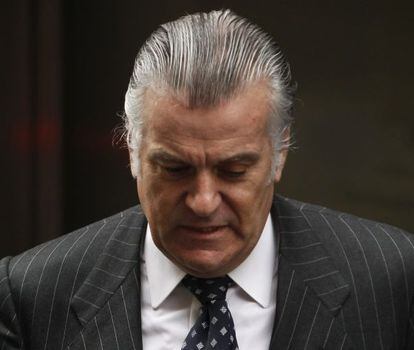US State Department report focuses on surge of Spanish public corruption
Human rights survey claims hate speech and police abuse continue to be a problem in Spain

The avalanche of political corruption prosecutions in Spain and a lack of government transparency constitute the main focus of last year’s annual survey of human rights conditions in countries throughout the world.
The 2013 Human Rights Report, issued Thursday by the US State Department, also points out that the “most significant” problems in Spain during the past year were reports of mistreatment of detainees and prisoners by police, and violence against women and children. As in past years, State Department officials said that other problems continued to exist such as prison overcrowding, the circulation of anti-Semitic and other hate-speech material on the internet, sexual harassment in the workplace, and the trafficking of women for sexual exploitation.
“The government generally took steps to prosecute officials, both in the security services and elsewhere in the government, who committed abuses. There were some instances where officials engaged in corruption and created the impression of impunity,” the 22-page report on Spain stated.
State Department officials focused on the two biggest cases that made headlines last year: the corruption investigation into former Popular Party treasurer Luis Bárcenas, and the inquiry into purported embezzlement and fraud committed through a regional government layoff fund by officials and others in Andalusia.
Anti-Semitic incidents,
including graffiti against Jewish institutions, continued
“According to the Attorney General’s Office, there were a record 235 corruption-related indictments in 2012, of which embezzlement of public funds represented 40 percent of total cases, followed by administrative malfeasance at 26 percent,” the report stated. “Sentences for crimes related to corruption increased by 151 percent in the last three years.”
In the most high-profile case, the State Department said that Bárcenas was charged with money laundering, bribery and tax fraud after investigators in January 2013 discovered a Swiss bank account in his name that held 12 million euros, and another one that reportedly held at one time 22 million euros. “Two other accounts in New York and Connecticut holding 4.5 million euros [$6.1 million] were also discovered.”
In Andalusia, the US government also highlighted the ongoing inquiry being carried out by Seville Judge Mercedes Alaya, who on March 20 jailed 20 suspects for their “misuse” of the layoff funds, which were destined to cover severance and early retirement pay at troubled companies who needed to lay off workers. “Members of the Spanish Socialist Workers’ Party from the Andalusian regional government were linked to fraudulent awards of public grants from the funds to companies that supported the party over the period 2000 to 2009,” the document stated.
As for government transparency, the State Department pointed out that the spouses and children of national lawmakers are not required to disclose their financial statements in the same way as the elected official is obligated to post his own income and assets on publicly available websites each year.
Jewish community leaders and the NGO Movement against Intolerance reported that while violence against members of the approximately 48,000-strong Jewish community was rare, anti-Semitic incidents, including graffiti against Jewish institutions, continued.
Specifically, the report detailed an incident that occurred in August in the Madrid satellite town of Pinto where vandals painted the words “Hitler was right” and a large swastika on the walls of the city’s bullring before a local celebration. “The city did not immediately remove the graffiti because to do so would have delayed the celebration. The city removed the graffiti after the bullfight ended,” the report stated.
NGOs also reported some 4,000 racist incidents in the past year, which were aimed at the Roma, African and Latin American communities, related to housing, abuses by security forces and work-related discrimination. Nevertheless, the Spanish government “generally undertook efforts to combat the problem,” the State Department said.
The report also mentioned the Popular Party’s (PP) proposed controversial Citizens Safety Law, which calls for high fines for some demonstrators who protest without a permit and use slogans that “insult” Spain and the country’s institutions. It said that on October 9, the Council of Europe’s commissioner for human rights received 230 complaints of “administrative inquires” by the central government’s delegate in Madrid, Cristina Cifuentes, against demonstrators who took part in protests between January and April last year.
The EC commissioner came out against the proposed law earlier this year.










































